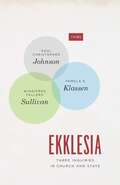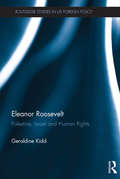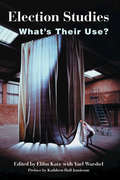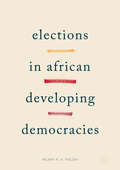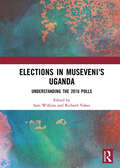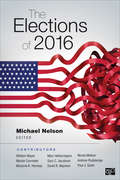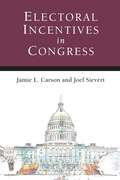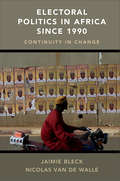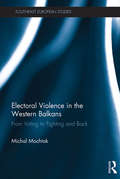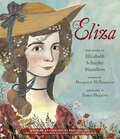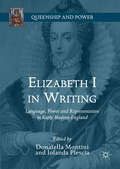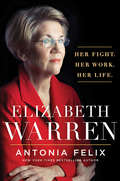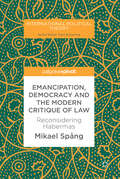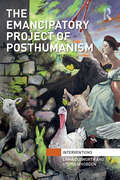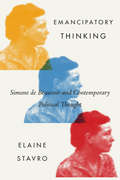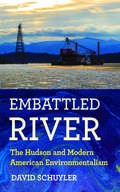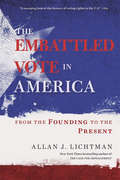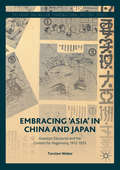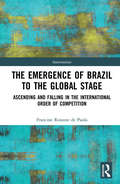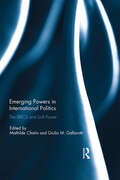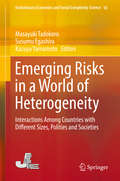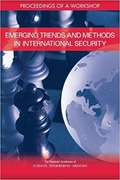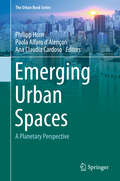- Table View
- List View
Ekklesia: Three Inquiries in Church and State (TRIOS)
by Paul Christopher Johnson Pamela E. Klassen Winnifred Fallers SullivanEkklesia: Three Inquiries in Church and State offers a New World rejoinder to the largely Europe-centered academic discourse on church and state. In contrast to what is often assumed, in the Americas the relationship between church and state has not been one of freedom or separation but one of unstable and adaptable collusion. Ekklesia sees in the settler states of North and South America alternative patterns of conjoined religious and political power, patterns resulting from the undertow of other gods, other peoples, and other claims to sovereignty. These local challenges have led to a continuously contested attempt to realize a church-minded state, a state-minded church, and the systems that develop in their concert. The shifting borders of their separation and the episodic conjoining of church and state took new forms in both theory and practice. The first of a closely linked trio of essays is by Paul Johnson, and offers a new interpretation of the Brazilian community gathered at Canudos and its massacre in 1896–97, carried out as a joint churchstate mission and spectacle. In the second essay, Pamela Klassen argues that the colonial churchstate relationship of Canada came into being through local and national practices that emerged as Indigenous nations responded to and resisted becoming “possessions” of colonial British America. Finally, Winnifred Sullivan’s essay begins with reflection on the increased effort within the United States to ban Bibles and scriptural references from death penalty courtrooms and jury rooms; she follows with a consideration of the political theological pressure thereby placed on the jury that decides between life and death. Through these three inquiries, Ekklesia takes up the familiar topos of “church and state” in order to render it strange.
Eleanor Roosevelt: Palestine, Israel and Human Rights (Routledge Studies in US Foreign Policy)
by Geraldine KiddMemorialised as a US heroine and an iconoclastic humanitarian who sought to protect society’s marginalised, Eleanor Roosevelt also, at times, disappointed contemporaries and biographers with some of her stances. Examining a period of her life that has not been extensively explored, this book challenges the previously held universality of Eleanor Roosevelt’s humanitarianism. The Palestinian question is used as a case study to explore the practical application of her commitment to social justice, and the author argues that, at times, Roosevelt’s humanitarianism was illogical, limited and flawed by pragmatism. New insights are provided into Eleanor Roosevelt’s human rights activism – its dichotomies, its inspiration, and the effect it had on US relations with the Middle East. This book will appeal to academics working across a range of disciplines including history, diplomatic history, American studies, Middle Eastern studies, US foreign policy, human rights and women’s studies.
Election Studies: What's Their Use?
by Elihu KatzAcademic studies of elections are not in the business of predicting outcomes. They are in the business of explaining them. The best studies treat voting data as raw material with which to explore socio-psychological processes such as individual decision-making and such sources of influence as issues, personality, media, socio-economic background, and party loyalty. The ebb and flow of ideologies and the comparative workings of different political systems are core topics on which election studies shed light. Looking back on more than fifty years of voting research, some of its major practitioners and critics reflect here on what has--and has not--been accomplished.
Elections in African Developing Democracies
by Hilary A. A. MiezahThe book explores the organization, conduct and supervision of elections in emerging democracies. It covers the broad spectrum of the democratic electoral process. This project is a synthesis of the author's practical knowledge and experience in the management of elections with the United Nations and other international organizations in Africa and Asia. The author addresses election practitioners, political parties, and all other stake holders, and provides a vision for building and blending indigenous traditions and systems of election into universally accepted norms and practices.
Elections in Museveni's Uganda
by Sam Wilkins and Richard VokesUganda’s 2016 elections, which returned thirty-year incumbent President Yoweri Museveni and his National Resistance Movement (NRM) in yet another landslide, took place in an atmosphere of patronage, coercion and fraud. But is this diagnosis sufficient to understand the processes of voting and regime maintenance in Uganda today? Based on a series of detailed case studies from across Uganda, this book provides a more nuanced and complex picture of what the Museveni regime is, and how it keeps winning elections. Whilst not denying that various electoral malpractices are systemic to the regime’s survival, the authors find that these cannot be extricated from Uganda’s history, its wider social realities, and its local political cultures in which the NRM has become so embedded. In so doing, the authors – who include anthropologists, development specialists, historians, geographers, and political-scientists – develop new ways of thinking about the meaning of voting and elections in non-democratic Uganda, and elsewhere. This edition was originally published as a special issue of the Journal of Eastern African Studies.
The Elections of 2016
by Michael C. NelsonBringing together a host of distinguished scholars, Michael Nelson's The Elections of 2016 reliably delivers a nuanced analysis of yet another momentous cycle of political contests. No other single volume can expose your students to the depth of analysis and expertise in this title. Whether discussing particular races or taking a broader look at the national trends, these contributors captivate students with engaging stories and political drama, while weaving in important scholarship and expert analysis. Available mere months after the election, each chapter, written specifically for this volume, offers readers historical perspective as well as a look forward at the implications for the American political system. New to this Edition Overview of Donald Trump’s campaign and what factors led to him winning the election. Analysis of the role that media and money played in the elections. Provides a look at Congressional elections, their outcomes, and impact.
The Elections of 2016
by Michael C. NelsonBringing together a host of distinguished scholars, Michael Nelson's The Elections of 2016 reliably delivers a nuanced analysis of yet another momentous cycle of political contests. No other single volume can expose your students to the depth of analysis and expertise in this title. Whether discussing particular races or taking a broader look at the national trends, these contributors captivate students with engaging stories and political drama, while weaving in important scholarship and expert analysis. Available mere months after the election, each chapter, written specifically for this volume, offers readers historical perspective as well as a look forward at the implications for the American political system. New to this Edition Overview of Donald Trump’s campaign and what factors led to him winning the election. Analysis of the role that media and money played in the elections. Provides a look at Congressional elections, their outcomes, and impact.
Electoral Incentives in Congress (Legislative Politics And Policy Making)
by Jamie L Carson Joel SievertDavid Mayhew’s 1974 thesis on the “electoral connection” and its impact on legislative behavior is the theoretical foundation for research on the modern U.S. Congress. Mayhew contends that once in office, legislators pursue the actions that put them in the best position for reelection. The electoral connection is a post-World War II phenomenon, but legislative scholars now suggest that Mayhew’s argument applies to earlier congressional eras. To assess these claims, Carson and Sievert investigate whether earlier legislators were motivated by the same factors that influence their behavior today, especially in pursuit of reelection. They examine how electoral incentives shape legislative behavior throughout the nineteenth century by looking at patterns of turnover in Congress; the re-nomination of candidates; the roles of parties in recruiting candidates, and by extension their broader effects on candidate competition; and, finally by examining legislators’ accountability. The results have wide-ranging implications for the evolution of Congress and the development of various legislative institutions over time.
Electoral Politics in Africa since 1990: Continuity in Change
by Jaimie Bleck Nicolas van de WalleDemocratic transitions in the early 1990s introduced a sea change in Sub-Saharan African politics. Between 1990 and 2015, several hundred competitive legislative and presidential elections were held in all but a handful of the region's countries. This book is the first comprehensive comparative analysis of the key issues, actors, and trends in these elections over the last quarter century. The book asks: what motivates African citizens to vote? What issues do candidates campaign on? How has the turn to regular elections promoted greater democracy? Has regular electoral competition made a difference for the welfare of citizens? The authors argue that regular elections have both caused significant changes in African politics and been influenced in turn by a rapidly changing continent - even if few of the political systems that now convene elections can be considered democratic, and even if many old features of African politics persist.
Electoral Violence in the Western Balkans: From Voting to Fighting and Back (Southeast European Studies)
by Michal MochtakSince the end of the Cold War there have been a number of cases where the democratization process has been turbulent, or even violent. Addressing electoral violence, its evolution and impact in the Western Balkans, this book explores the conflict logic of election and tries to understand its basic patterns. Two decades of electoral competition in the region are analysed to identify an interesting evolution of electoral violence in terms of forms, actors, motivations and dynamics. By identifying the potential drivers of electoral violence and explaining the escalation and stimulus of violence-related events, the author combines a theoretical approach with original data to emphasise the variability of the phenomenon and its evolution in the region. The book will appeal to students and scholars of post-communist Europe and democratisation processes and the Western Balkans in particular. It should also be of interest to political advisors and those involved in developing or implementing democratisation programmes.
Eliza: With an Afterword by Phillipa Soo, the Original Eliza from Hamilton: An American
by Margaret McNamaraFans of the musical Hamilton and their children won't want to miss this stunning picture book biography about Eliza Hamilton, American Founding Father Alexander Hamilton's extraordinary wife and an important figure in her own right. Includes an afterword from Phillipa Soo, the actress who originated the role of Eliza in Hamilton!We all know the story of scrappy Alexander Hamilton and his rise in American politics--but how much do we know about his workmate, inspiration, and stabilizing force, Elizabeth Schuyler Hamilton? Margaret McNamara employs the letter-writing style of the period to tell the story of Eliza Hamilton, who was born into a family of considerable wealth, power, and influence in Albany, New York, in 1757. Eliza was expected to marry into a similarly powerful family . . . until she met and fell in love with the charismatic Hamilton. She stood by him throughout his tumultuous life, and after his death, she single-handedly collected his papers and preserved them for historians and musical-theater writers of the future. Eliza outlived Hamilton by fifty years; during that time she founded the first orphanage in New York State, raised funds for the Washington Monument, and kept the flame of her husband's memory and achievements alive. This is a beautiful and informative biography featuring extensive back matter--including information about America's revolution, the historical relevance of letter writing, and a timeline--and exquisite, thoroughly researched art that mirrors paintings from 18th-century America. Every Hamilton lover will want to gift it to the young readers in their lives.
Elizabeth I in Writing: Language, Power And Representation In Early Modern England (Queenship and Power)
by Donatella Montini Iolanda PlesciaThis collection investigates Queen Elizabeth I as an accomplished writer in her own right as well as the subject of authors who celebrated her. With innovative essays from Brenda M. Hosington, Carole Levin, and other established and emerging experts, it reappraises Elizabeth’s translations, letters, poems and prayers through a diverse range of approaches to textuality, from linguistic and philological to literary and cultural-historical. The book also considers Elizabeth as “authored,” studying how she is reflected in the writing of her contemporaries and reconstructing a wider web of relations between the public and private use of language in early modern culture. Contributions from Carlo M. Bajetta, Guillaume Coatelen and Giovanni Iamartino bring the Queen’s presence in early modern Italian literary culture to the fore. Together, these essays illuminate the Queen in writing, from the multifaceted linguistic and rhetorical strategies that she employed, to the texts inspired by her power and charisma.
Elizabeth Warren: Her Fight. Her Work. Her Life.
by Antonia FelixA breakthrough Elizabeth Warren biography by best-selling author Antonia Felix.Elizabeth Warren's rise as one of America's most powerful women is a stirring lesson in persistence. From her fierce support of the middle class to her unapologetic response to political bullies, Warren is known as a passionate yet plain-speaking champion of equity and fairness. In the wake of one fellow senator's effort to silence her in 2016, three words became a rallying cry across the country:Nevertheless, she persisted...In this Elizabeth Warren book, best-selling author Antonia Felix carries readers from Warren's hardscrabble roots in Norman, Oklahoma, to her career as one of the nation's most distinguished legal scholars and experts on the economics of working Americans. Felix reveals how Senator Elizabeth Warren brought her expertise to Washington to become an icon of progressive politics in a deeply divided nation, and weaves together never-before-told stories from those who have journeyed with Warren from Oklahoma to the halls of power.Praise for Elizabeth Warren: Her Fight. Her Work. Her Life.:"Many politicians focus on the 'me'. Elizabeth Warren has always been about the 'we'—that sacred American bond of equal justice for all that Dr. King fought for. Felix's biography explains why we need her 'persistent' voice more than ever, now and in the future." — Congressman John Lewis"Felix is an excellent writer, and her book is, at its best, quite interesting." — NPR Books
Emancipation, Democracy and the Modern Critique of Law: Reconsidering Habermas (International Political Theory)
by Mikael SpångThis book focuses on Jürgen Habermas’ theorising on law, rights and democracy in light of the modern critique of law. The latter tradition, which goes back to Hegel and Marx, has addressed the limitations of rights as vocabulary of emancipation and law as language of autonomy. Since Habermas claims that his reconstruction of private and public autonomy has an emancipatory aim, the author has chosen to discuss it in the context of the modern critique of law. More specifically, the study addresses the need to consider the dialectic of law, in which law is both a condition for emancipation and domination, when discussing what law and rights permit. It will appeal to students and scholars across the fields of political theory, law and legal criticism, as well as sociology and sociology of law.
The Emancipatory Project of Posthumanism (Interventions)
by Erika Cudworth Stephen HobdenThis is the first book to make the argument for an emancipatory project from within a posthuman framework. Responding to critics, Cudworth and Hobden argue that while some posthumanisms may be less critical, it is possible to develop a political programme from a posthuman perspective. Cudworth and Hobden develop such issues by addressing the following questions: How have ideas about emancipation been developed, and does the notion of emancipation still hold relevance for the contemporary world order? Is it possible to have a non-Utopian form of emancipation? What are the implications of differing posthuman/new materialist viewpoints for an emancipatory project? In a world typified by complexity, how is it possible to pursue political projects? The chapters consider various interpretations of the term ‘emancipation’, looking at work that has appeared within the posthumanist framework such as Bruno Latour, William Connolly, and Jane Bennett. The authors develop their own account of posthumanism, demonstrating how it avoids the problems that have been found within this framework, and considering the possibilities for emancipatory projects and public policy. It will be of great interest to postgraduates and scholars of International Relations, Political Theory, Environmental Studies, and Sociology.
Emancipatory Thinking: Simone de Beauvoir and Contemporary Political Thought (McGill-Queen's Studies in the History of Ideas #76)
by Elaine StavroMost scholars have focused on The Second Sex and Simone de Beauvoir’s fiction, concentrating on gender issues but ignoring her broader emancipatory vision. Though Beauvoir’s political thinking is not as closely studied as her feminist works, it underpinned her activism and helped her navigate the dilemmas raised by revolutionary thought in the postwar period. In Emancipatory Thinking Elaine Stavro brings together Beauvoir’s philosophy and her political interventions to produce complex ideas on emancipation. Drawing from a range of work, including novels, essays, autobiographical writings, and philosophic texts, Stavro explains that for Beauvoir freedom is a movement that requires both personal and collective transformation. Freedom is not guaranteed by world historical systems, material structures, wilful action, or discursive practices, but requires engaged subjects who are able to take creative risks as well as synchronize with existing forces to work towards collective change. Beauvoir, Stavro asserts, resisted the trend of anti-humanism that has dominated French thinking since the 1960s and also managed to avoid the pitfalls of voluntarism and individualism. In fact, Stavro argues, Beauvoir appreciated the impact of material, socio-economic, institutional forces, without forgoing the capacity to initiate. Applying Beauvoir’s existential insights and understanding of embodied and situated subjectivity to recent debates within gender, literary, sociological, cultural, and political studies, Emancipatory Thinking provides a lens to explore the current political and theoretical landscape.
Embattled River: The Hudson and Modern American Environmentalism
by David SchuylerIn Embattled River, David Schuyler describes the efforts to reverse the pollution and bleak future of the Hudson River that became evident in the 1950s. Through his investigative narrative, Schuyler uncovers the critical role of this iconic American waterway in the emergence of modern environmentalism in the United States.Writing fifty-five years after Consolidated Edison announced plans to construct a pumped storage power plant at Storm King Mountain, Schuyler recounts how a loose coalition of activists took on corporate capitalism and defended the river. As Schuyler shows, the environmental victories on the Hudson had broad impact. In the state at the heart of the story, the immediate result was the creation in 1970 of the New York State Department of Environmental Conservation to monitor, investigate, and litigate cases of pollution. At the national level, the environmental ferment in the Hudson Valley that Schuyler so richly describes contributed directly to the creation of the Environmental Protection Agency in 1970, the passage of the Clean Water Act in 1972, and the creation of the Superfund in 1980 to fund the cleanup of toxic-dumping sites.With these legal and regulatory means, the contest between environmental advocates and corporate power has continued well into the twenty-first century. Indeed, as Embattled River shows, the past is prologue. The struggle to control the uses and maintain the ecological health of the Hudson River persists and the stories of the pioneering advocates told by Schuyler provide lessons, reminders, and inspiration for today's activists.
The Embattled Vote in America: From the Founding to the Present
by Allan J. LichtmanAmericans have died for the right to vote. Yet our democratic system guarantees no one, not even citizens, the opportunity to elect a government. Allan Lichtman calls attention to the founders’ greatest error—leaving the franchise to the discretion of individual states—and explains why it has triggered an unending struggle over voting rights.
An Ember in the Ashes (An Ember in the Ashes #1)
by Sabaa TahirBOOK ONE IN THE NEW YORK TIMES BESTSELLING SERIESOne of Time Magazine&’s 100 Best Fantasy Books of All TimeOne of Time Magazine&’s 100 Best YA Books of All Time Instant New York Times bestsellerFrom #1 New York Times bestselling author Sabaa TahirAmazon's Best Young Adult Book of 2015People's Choice Award winner - Favorite FantasyBustle's Best Young Adult Book of 2015 &“This novel is a harrowing, haunting reminder of what it means to be human — and how hope might be kindled in the midst of oppression and fear.&” — The Washington Post &“An Ember in the Ashes could launch Sabaa Tahir into JK Rowling territory…It has the addictive quality of The Hunger Games combined with the fantasy of Harry Potter and the brutality of Game of Thrones.&”—Public Radio International "An Ember in the Ashes glows, burns, and smolders—as beautiful and radiant as it is searing."—Huffington Post &“A worthy novel – and one as brave as its characters.&” —The New York Times Book Review Laia is a slave. Elias is a soldier. Neither is free. Under the Martial Empire, defiance is met with death. Those who do not vow their blood and bodies to the Emperor risk the execution of their loved ones and the destruction of all they hold dear. It is in this brutal world, inspired by ancient Rome, that Laia lives with her grandparents and older brother. The family ekes out an existence in the Empire&’s impoverished backstreets. They do not challenge the Empire. They&’ve seen what happens to those who do. But when Laia&’s brother is arrested for treason, Laia is forced to make a decision. In exchange for help from rebels who promise to rescue her brother, she will risk her life to spy for them from within the Empire&’s greatest military academy. There, Laia meets Elias, the school&’s finest soldier—and secretly, its most unwilling. Elias wants only to be free of the tyranny he&’s being trained to enforce. He and Laia will soon realize that their destinies are intertwined—and that their choices will change the fate of the Empire itself.
Embracing 'Asia' in China and Japan
by Torsten WeberThis book examines how Asianism became a key concept in mainstream political discourse between China and Japan and how it was used both domestically and internationally in the contest for political hegemony. It argues that, from the early 1910s to the early 1930s, this contest changed Chinese and Japanese perceptions of 'Asia', from a concept that was foreign-referential, foreign-imposed, peripheral, and mostly negative and denied (in Japan) or largely ignored (in China) to one that was self-referential, self-defined, central, and widely affirmed and embraced. As an ism, Asianism elevated 'Asia' as a geographical concept with culturalist-racialist implications to the status of a full-blown political principle and encouraged its proposal and discussion vis-#65533;-vis other political doctrines of the time, such as nationalism, internationalism, and imperialism. By the mid-1920s, a great variety of conceptions of Asianism had emerged in the transnational discourse between Japan and China. Terminologically and conceptually, they not only paved the way for the appropriation of 'Asia' discourse by Japanese imperialism from the early 1930s onwards but also facilitated the embrace of Sino-centric conceptions of Asianism by Chinese politicians and collaborators.
The Emergence of Brazil to the Global Stage: Ascending and Falling in the International Order of Competition (Interventions)
by Francine Rossone de PaulaHow do discourses about Brazil’s emergence as a global actor at the beginning of the twenty-first century reinforce particular temporal and spatial formations that enable the perpetuation of international hierarchies? This volume argues that while the phenomenon of ‘emergence’ was celebrated as the conquest of more authority for Brazil on the global stage, especially as Brazil was presented as a leader of developing countries, discourses about Brazil as an actor who was finally arriving at its promised future as a global player were also perpetuating a spatiotemporal structure that continues to reward some societies and individuals at the expense of many others. Brazil's success or failure has depended from the beginning on how well it would perform its pre-determined role as a newly relevant or emergent 'global player'. Power and empowerment have been conceptualized in a way that discursively inhibits any form of escape from the temporal and spatial confines of a world order marked by geopolitical and geoeconomic competition. The book can be seen as an initial step towards an exploration of alternative forms of thinking, doing, and being, temporally and spatially, that are not limited to the competition among states for geopolitical status in the international system. This work will be of great interest to students and scholars of critical international relations, international politics and Latin American studies.
Emerging Powers in International Politics: The BRICS and Soft Power
by Mathilde Chatin Giulio M. GallarottiThe rise of large and rapidly growing nations is having a significant impact on the global order, as their expanding influence reshapes the structure of power in the international system. These emerging powers are increasingly asserting themselves as major actors on the global scene. Leading this cadre of emerging powers are five nations referred to as the BRICS – Brazil, Russia, India, China and South Africa. This book takes inventory of both the individual and collective soft power of this rising bloc of nations. Having embraced the potential of this newly emphasized type of power as a means of generating international influence, these nations have dedicated substantial effort and resources to implementing a soft power offensive.This book was originally published as a special issue of the Journal of Political Power.
Emerging Risks in a World of Heterogeneity: Interactions Among Countries with Different Sizes, Polities and Societies (Evolutionary Economics and Social Complexity Science #10)
by Kazuya Yamamoto Susumu Egashira Masayuki TadokoroThis uniquely interdisciplinary volume analyzes the challenges posed by the heterogeneity of the world where radically different players are crammed into increasingly limited political, commercial, social, and ecological space. The rapid rise of Communist Party-ruled China is posing serious challenges to the postwar politico-economic architecture dominated by the United States. Russia, once expected to become a partner of the liberal Western international order, has started behaving in an increasingly unilateral fashion. The developing world is more characterized by failed governance rather than convergence to liberal democracies as was hoped by many Western authors. Given links provided by low-cost carriers, the Internet, and trade and investment, we simply cannot shield ourselves from influences, whether benign or malign, from neighbors on this planet.The authors, including political scientists, economists, social physicists, and experts on complexity theory and informatics, examine how interactions among actors with different properties can cause problems, and they analyze risks resulting from the interactions. While employing a variety of approaches to address topics such as economic interdependence among democracies and authoritarian states, the development assistance regimes, internal conflicts in developing countries, and cyber security, the whole volume presents a clear overview of challenges and risks the world is facing. This work makes a valuable contribution to students of social sciences as well as to practitioners interested in the emerging global order.
Emerging Trends and Methods in International Security: Proceedings of a Workshop
by Engineering Medicine National Academies of SciencesBeginning in October 2017, the National Academies of Sciences, Engineering, and Medicine organized a set of workshops designed to gather information for the Decadal Survey of Social and Behavioral Sciences for Applications to National Security. The second workshop focused on emerging trends and methods in international security and this publication summarizes the presentations and discussions from this workshop.
Emerging Urban Spaces: A Planetary Perspective (The Urban Book Series)
by Ana Claudia Cardoso Paola Alfaro D’Alençon Philipp HornThis edited collection critically discusses the relevance of, and the potential for identifying conceptual common ground between dominant urban theory projects – namely Neo-Marxian accounts on planetary urbanization and alternative ‘Southern’ post-colonial and post-structuralist projects. Its main objective is to combine different urban knowledge to support and inspire an integrative research approach and a conceptual vocabulary which allows understanding the complex characteristics of diverse emerging urban spaces. Drawing on in-depth case study material from across the world, the different chapters in this volume disentangle planetary urbanization and apply it as a research framework to the context-specific challenges faced by many `ordinary' urban settings. In addition, through their focus on both Northern- and Southern urban spaces, this edited collection creates a truly global perspective on crucial practice-relevant topics such as the co-production of urban spaces, the ‘right to diversity’ and the ‘right to the urban’ in particular local settings.
